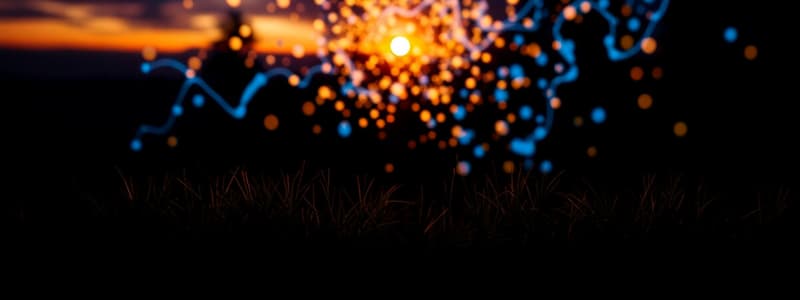Podcast
Questions and Answers
Which perspective emphasizes the interplay between biological factors and contextual influences in adolescent development?
Which perspective emphasizes the interplay between biological factors and contextual influences in adolescent development?
- Organismic Theory (correct)
- Bioecological Model
- Learning Theory
- Sociological Theory
In operant conditioning, what primarily shapes behavior?
In operant conditioning, what primarily shapes behavior?
- Unconditioned stimuli
- Observed behaviors
- Conditioned stimuli
- Consequences of actions (correct)
Which sociological concept focuses on the challenges faced by adolescents as they transition into adulthood?
Which sociological concept focuses on the challenges faced by adolescents as they transition into adulthood?
- Marginalization (correct)
- Modeling
- Classical conditioning
- Role of cognition
What is a key feature of the anthropological perspective on adolescent development?
What is a key feature of the anthropological perspective on adolescent development?
Among the following, which theorist is associated with the concept of formal operational thought in adolescence?
Among the following, which theorist is associated with the concept of formal operational thought in adolescence?
According to the information provided, what is G. Stanley Hall primarily known for in the context of adolescence?
According to the information provided, what is G. Stanley Hall primarily known for in the context of adolescence?
Which of the perspectives on adolescence is presented as being at the opposite extreme from G. Stanley Hall's?
Which of the perspectives on adolescence is presented as being at the opposite extreme from G. Stanley Hall's?
According to the information, what is the 'Recapitulation' concept associated with?
According to the information, what is the 'Recapitulation' concept associated with?
What does the Dual Systems Theory, as described, primarily focus on regarding adolescent development?
What does the Dual Systems Theory, as described, primarily focus on regarding adolescent development?
What aspect of gene influence on adolescent development is highlighted?
What aspect of gene influence on adolescent development is highlighted?
Which system, related to physical maturation, is mentioned as being closely interconnected with various other systems?
Which system, related to physical maturation, is mentioned as being closely interconnected with various other systems?
What does the root word of 'Organismic' refer to?
What does the root word of 'Organismic' refer to?
What topic will be discussed in detail in the upcoming chapter, according to the information provided?
What topic will be discussed in detail in the upcoming chapter, according to the information provided?
According to the provided material, which of the following best describes the nature of adolescence?
According to the provided material, which of the following best describes the nature of adolescence?
What is a primary characteristic defining the 'emerging adulthood' phase, as conceptualized by Arnett?
What is a primary characteristic defining the 'emerging adulthood' phase, as conceptualized by Arnett?
Which of the following is NOT explicitly mentioned as a boundary marker for the start or end of adolescence?
Which of the following is NOT explicitly mentioned as a boundary marker for the start or end of adolescence?
According to historical perspectives, how did Plato view the stage of 'young manhood'?
According to historical perspectives, how did Plato view the stage of 'young manhood'?
Which historical figure is associated with the concept that adolescents should learn from 'natural consequences'?
Which historical figure is associated with the concept that adolescents should learn from 'natural consequences'?
What is a crucial feature that defines adulthood as mentioned in this material?
What is a crucial feature that defines adulthood as mentioned in this material?
Which of the following best represents a limitation of Arnett's theory of emerging adulthood, as suggested in the content?
Which of the following best represents a limitation of Arnett's theory of emerging adulthood, as suggested in the content?
Which of the following terms is NOT used in the material to describe individuals between 11 and 25 years of age?
Which of the following terms is NOT used in the material to describe individuals between 11 and 25 years of age?
Flashcards
Adolescence
Adolescence
The period between the ages of 11 and 25, characterized by significant physical, emotional, and social changes. This stage involves transitions from childhood to adulthood.
Emerging Adulthood
Emerging Adulthood
A period of development from age 18 to 25, marked by exploration of identity, instability, self-focus, a feeling of being in-between, and a sense of boundless possibilities.
Transition
Transition
The starting point and concluding point of adolescence are not fixed, but rather involve a combination of biological, chronological, legal, social, psychological, and cognitive factors.
Defining Adulthood
Defining Adulthood
Signup and view all the flashcards
Plato's Phases of Childhood
Plato's Phases of Childhood
Signup and view all the flashcards
Aristotle's Views on Adolescence
Aristotle's Views on Adolescence
Signup and view all the flashcards
Life Cycle Service
Life Cycle Service
Signup and view all the flashcards
Social Construction of Adolescence
Social Construction of Adolescence
Signup and view all the flashcards
Biological/Biosocial Viewpoints of Adolescence
Biological/Biosocial Viewpoints of Adolescence
Signup and view all the flashcards
Recapitulation (Hall's theory)
Recapitulation (Hall's theory)
Signup and view all the flashcards
Recapitulation
Recapitulation
Signup and view all the flashcards
Dual Systems Theory (Adolescence)
Dual Systems Theory (Adolescence)
Signup and view all the flashcards
Genetic Influences on Adolescence
Genetic Influences on Adolescence
Signup and view all the flashcards
Environmental Influences on Adolescence
Environmental Influences on Adolescence
Signup and view all the flashcards
Pubertal Maturation
Pubertal Maturation
Signup and view all the flashcards
Organismic Theories of Adolescence
Organismic Theories of Adolescence
Signup and view all the flashcards
Organismic View of Development
Organismic View of Development
Signup and view all the flashcards
Organismic Stage Theories
Organismic Stage Theories
Signup and view all the flashcards
Teleological Development (in Organismic Theories)
Teleological Development (in Organismic Theories)
Signup and view all the flashcards
Sociological View of Adolescence
Sociological View of Adolescence
Signup and view all the flashcards
Anthropological/Historical View of Adolescence
Anthropological/Historical View of Adolescence
Signup and view all the flashcards
Study Notes
Introduction to the Psychology of Adolescents (Psy 3220)
- Course information provided, including instructor (Dr. Mary Lewis), Parent and Adolescent Development Lab, and Oakland University affiliation
- Course website (Moodle) with links for syllabus and office hours
- Key terms for the period of adolescence (11-25 years), including adolescents, teenagers, teens, tweens, emerging adults, and youth, are listed
- Questions presented about the period of adolescence focus on what best defines the period and the role of transitions in the period's characteristics.
Boundaries of Adolescence
-
Factors defining the boundaries of adolescence include biological/physiological, chronological age, legal, social, psychological, and cognitive aspects
-
The beginning and end of adolescence are also considerations
-
Information regarding the start and end of adolescence, as it relates to each of these perspectives is presented in table format.
Defining Adulthood
- The discussion of what defines adulthood involves the criteria and examples for the recognition of an adult.
- A definition of adulthood is presented, including the completion of physical, emotional, and social development, as well as the cultural implications of role definition and assignment.
- The idea of adolescence as a series of overlapping transitions is presented as a potential way to consider the complexities of adolescence.
Emerging Adulthood (Arnett, 2000)
- Emerging Adulthood, as defined by Arnett, 2000, occurs from ages 18 to 25
- Key characteristics of this period include identity exploration, instability, self-focus, a feeling of being "in-between," and age possibilities.
- The limitations of this model, including cultural and socioeconomic applicability, are questions raised for further consideration.
History of Adolescence
- The concept of adolescence is considered.
- Historical perspectives from ancient philosophers to modern theorists such as Plato, Aristotle, St. Augustine, and G. Stanley Hall are presented
- Discussion of whether adolescence is a real period or a social construct
- The concept of "Life Cycle Service" is discussed in relation to the history of adolescence.
Theories of Adolescence: Biological/Biosocial viewpoints
- Different perspectives on adolescence range from extremely biological to extremely environmental.
- Key theorists and associated theories, including recap, Darwin, G. Stanley Hall, "storm & stress", and dual systems theory are discussed.
Theories Explaining Adolescence: Learning Theories
- Classical conditioning (UCS, UCR, CS, CR, Main Principles)
- Operant conditioning (Consequences, Reinforcement, Punishment, Main Principles)
- Social Learning Theory (Observation, Modeling, Role of Cognition)
Theories Explaining Adolescence: Sociological & Anthropological
- Sociological perspectives, focusing on a group of people in relation to society as a whole (Jessor).
- Includes broader concepts such as coming of age, marginalization, and issues of generational gaps.
- Anthropological/historical viewpoints (Elder) emphasize recognition of growing up as an adolescent within specific historical or cultural contexts.
Theories Explaining Adolescence: Bioecological Models
- Bronfenbrenner's bioecological model is introduced, describing various levels of influence in a child's development.
- Bronfenbrenner & Morris (2001) PPCT Categories (Process, Person, Context, Time) are summarized.
Additional Notes on Adolescence
- Important topics from other models of development (e.g., Organismic, etc.) are introduced for further study.
- Considerations of the Endocrine System, Pubertal Maturation, Physical stature and development is presented, with further discussion slated for a future session.
Studying That Suits You
Use AI to generate personalized quizzes and flashcards to suit your learning preferences.
Related Documents
Description
Explore the key concepts and boundaries defining adolescence in this quiz. Understand the various factors—including biological, psychological, and social—that contribute to the transition from adolescence to adulthood. This quiz is essential for students enrolled in Psy 3220, taught by Dr. Mary Lewis at Oakland University.




